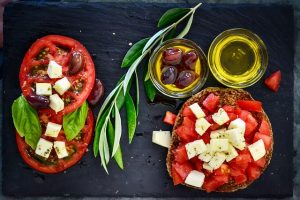Could Your Diet and Chronic Pain Be Related?
Yes. Scientists say your diet and chronic pain could be related! A typical American diet can make the body susceptible to pain, while some diets can do the opposite.
The Link Between Diet and Chronic Pain
Taking anti-inflammatories is a common recommendation for those who suffer from back or neck pain. That’s because the reduced inflammation (ie: swelling) can relieve pressure on joints and nerves. With that in mind, what do you think would happen if you ate something that led to more inflammation? You would expect the opposite, an increased chance of pain.
 The Typical American Diet
The Typical American Diet
Average Americans eat too much meat, refined grains, and sweets. They also don’t eat enough fruits and vegetables. This nutritional combination leads to an imbalance in the essential nutrients the body needs.
Omega-3 and Omega-6 (Essential Fatty Acids)
Fatty acids are the building blocks of the food we eat. Most fatty acids can be produced within our body but some cannot. The ones we cannot produce, called essential fatty acids, must be obtained by the food we eat. Two of the main groups of essential fatty acids are omega-3 and omega-6.
- Omega-3 fatty acids are primarily found in fruits, vegetables and animals such as fish. One of the functions of the omega-3 fatty acids is to reduce inflammation.
- Omega-6 fatty acids can come from oils, fried foods, and grains. These fatty acids increase the rate of inflammation in the body.
A Balanced Diet
While both types of fatty acids are necessary for your body, it’s important that they are consumed in a proper ratio, (ie: a balanced diet). The typical American diet includes too many sweets, french fries and refined grains (omega-6) and not enough fruits and vegetables (omega-3).
The resulting ratio throws off the chemical balance within our body. We end up having too much of the chemicals that promote inflammation and not enough of the ones that inhibit inflammation. This results in too much inflammation within our body, which can make us more susceptible to pain.
So, in effect, a typical American diet increases our risk for inflammation and chronic pain. For individuals with a spine condition, this dietary imbalance can increase inflammation, putting pressure on nerves and joints and lead to pain.
Could a Change in Diet Help Your Chronic Pain?
If diet can lead to inflammation in our bodies could the reverse be true? Could food act as an anti-inflammatory, similar to the Ibuprofin you take? Studies say yes – scientists have found that certain diets can actually reduce inflammation in the body. They’ve also seen a change in diet relieve pain caused by inflammation, as in the case with rheumatoid arthritis.
Specifically, researchers have found these foods to help reduce inflammation in the body:
Polyunsaturated Fatty Acids
Polyunsaturated fatty acids include many essential fatty acids such as Omega-3 and Omega-6. The body needs these particular compounds but cannot make them itself so they must come from a person’s diet or dietary supplements. These essential nutrients can be found in foods such as fish, leafy vegetables, seeds, walnuts and olive oil.

Mediterranean Diet
There has been a lot of talk in recent years about the positive effects of the Mediterranean Diet. This diet, inspired by the diet found in Southern Italy and Greece, is heavy in olive oil, fruits, vegetables and fish. It also includes dairy products such as cheese and yogurt as well as wine. People who follow the Mediterranean Diet eat only a small amount of non-fish meat.
Antioxidants
Vitamin C, E and A and beta-carotene are all anti-oxidants. Some foods rich in these vitamins are fruits, vegetables, eggs, beans and nuts. However, the level of antioxidants in these foods can be reduced based on how the food is prepared. For example, vegetables that have been exposed to prolonged cooking or processing will have less antioxidants than their raw counterparts.
What Can You Do?
While much research is still needed in this field there is plenty of evidence to support the fact that an individual’s diet and chronic pain are linked. With that in mind, think about what you eat on a regular basis. Are there small changes you can make in your diet to minimize sweets and increase your consumption of fruits and vegetables? Your body might thank you for it.
References
- https://www.ncbi.nlm.nih.gov/pubmed/11986578
- https://www.ncbi.nlm.nih.gov/pubmed/25952067
- https://www.ncbi.nlm.nih.gov/pubmed/24528339
- https://www.ncbi.nlm.nih.gov/pubmed/11986578
- https://en.wikipedia.org/wiki/Polyunsaturated_fatty_acid
- https://en.wikipedia.org/wiki/Essential_fatty_acid
- https://en.wikipedia.org/wiki/Mediterranean_diet
- https://en.wikipedia.org/wiki/Antioxidant
- https://www.brainmdhealth.com/blog/omega-fatty-acids-proper-ratio-key/
